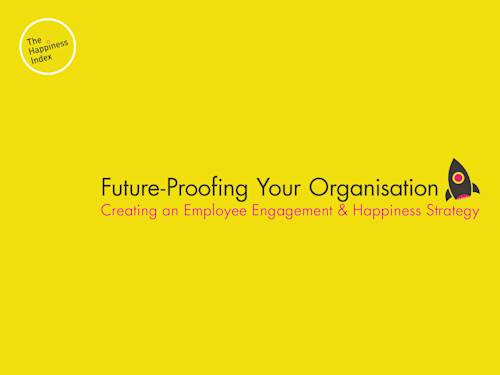
Creating an Employee Engagement AND Happiness Strategy
Jordan Harbinger, founder of 'The Art of Charm' training company shares an interesting insight about business: He observes that most people believe there are two routes to success: being smarter or working harder. However, after working on Wall Street, Jordan realised there is a ceiling to this strategy. Everyone on Wall Street came from Ivy League Colleges. Everyone there was working 15+ hours a day. How could Jordan expect to excel?
Jordan then observed one of the senior partners who was never present. When everyone else was slaving away, this man dictated his own hours. Jordan wanted to find out his secret, so he asked him how he did it:" I bring in all the deals for this company," The man explained. "I'm more valuable outside the office than in it.
Jordan suddenly realised there was another step to success. It wasn't intelligence, it wasn't even work ethic - it was communication and relationships.
Internal and external relationships are key to a thriving business. What relationships you form with prospects, partners and clients has obvious tangible benefits in terms of how much money you make. However, the relationships that you can form with your workforce and team is just as valuable. Bad internal relationships lower worker's wellbeing, which impacts productivity. They also lead to poor communication. Poor communication results in key information not being shared with all tiers of the company.
Focusing on communication as a leader is a smart decision for your business. Let's examine some ways you can boost communication:
Many business leaders believe that criticism will stop a person making a mistake again and improve performance. In fact, when you criticise someone's mistake, you make that mistake salient in their mind - it's all they can think of. If I tell you not to think of a pink elephant, what we both know what you will do.
The same thing happens when you criticise mistakes. I'm not saying that mistakes shouldn't be evaluated and feedback given, but raw criticism is not effective. A particularly poor communication habit is to criticise character. When someone makes a mistake, they get criticised for being 'lazy', 'incompetent' or 'careless'. Character attacks do not boost performance. When someone gets told something over and over, all that does is reinforce that attribute in their mind.
Has someone ever said something nasty to you that has stuck with you ever since? When something is highly emotive, it is reinforced deeper in our memories.
You might understand how criticism is damaging to someone's performance, but do you also realise that praise can be too?
When people are praised for an outcome, this inflates their ego and causes them to link attainment with appreciation. Resulting in them believing that they can get by on talent alone. Often, they will avoid taking on challenging tasks, as they want to continue to get easy wins. This includes cutting corners, inflating figures and adopting negative office politics.
When you choose not to compliment the result, but the process leading to that result then something different happens. You create individuals who thrive on challenge and find joy and fulfilment in the process of work, not just getting the results.
This is one component of Brendon Burchard's '6 principles of leadership.' The principle is founded on the fact that people support what they create. So, the more involved someone is with the creation of something, the more passionate they are about it.
One of the key principles of leadership communication is to promote dialogue, not monologue. It can be easy to fall into the trap of looking at an inspirational leaders such as Martin Luther King or Nelson Mandela and believing it's all about charismatic oration. Yes, these leaders could inspire others with their words - but mainly because they were speaking to a shared consciousness; based on shared visions and values.
To be an effective leader, you must create the dialogue with your workforce. Try not to see yourself as a leader and them as followers, but rather see yourselves as joint collaborators. Ask them to contribute to the discussion on what the company represents, and the direction it is going. Then ask further questions. Perform a deep-dive discovery process into how your company functions and what it can achieve.
Effective communication is one of the cornerstones of business.
By adopting regular employee surveys, you can have two-conversations with your people in real-time. Regular communication will help you to remedy their concerns and build tailored action plans off the back of their insights.
Employee surveys will provide a platform for your people to have two-way dialogue with you and communicate their hopes, concerns and ideas - ensuring everyone feels like their opinion matters. It will also help you learn what to stop, start, change and continue to make your people happier and more productive. This will improve employee engagement, productivity and retention, ultimately boosting your bottom line.
Many companies are only fulfilling a fraction of their potential because of poor communication. Business leaders can be ignorant to the concerns of those below and the workforce is distrusting of those above. It is not a united company; but rather many micro-companies operating independently of each other. No business can truly thrive with such division.
With a few simple communication tweaks, you can create greater engagement in your workforce, nurture hard workers who thrive on challenge, and create a grander vision for your company than you thought possible.

Linked to Engagement in our neuroscience methodology... learn more
The Happiness Index helps organisations measure the key employee engagement AND happiness drivers to power their people strategy.
Our unique platform offers the products, insights and tools to shine a light on your cultural health and empower management to drive thriving cultures.
Our neuroscience-based pre-built surveys measure the full employee experience - from onboarding to exit to empower and enable organisations to understand their people and create data-led action plans.